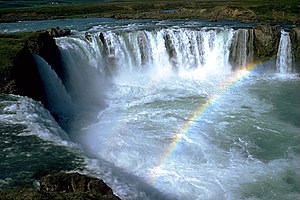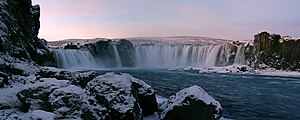| This article needs additional citations for verification. Please help improve this article by adding citations to reliable sources. Unsourced material may be challenged and removed. Find sources: "Goðafoss" – news · newspapers · books · scholar · JSTOR (October 2019) (Learn how and when to remove this message) |
| Goðafoss | |
|---|---|
 Aerial panorama of Goðafoss Aerial panorama of Goðafoss | |
 | |
| Location | North of Iceland |
| Total height | 12 m (39 ft) |
| Total width | 30 m (98 ft) |
Goðafoss (Icelandic pronunciation: [ˈkɔːðaˌfɔsː] ) is a waterfall in northern Iceland. It is located along the country's main ring road at the junction with the Sprengisandur highland road, about 45 minutes from Akureyri. The water of the river Skjálfandafljót falls from a height of 12 metres over a width of 30 metres. A 1.8-mile hiking trail loops around the waterfall area.
Name


The origin of the waterfall's name is not completely clear. In modern Icelandic, the name can be read either as "waterfall of the goð (gods)" or "waterfall of the goði (chieftain)." Linguist and placename expert Svavar Sigmundsson suggests that the name derives from two crags at the falls which resemble pagan idols. In 1879–1882, a myth was published in Denmark according to which the waterfall was named when the lawspeaker Þorgeir Ljósvetningagoði made Christianity the official religion of Iceland in the year 999 or 1000. Upon returning home from the Alþingi, Þorgeir supposedly threw his statues of the Norse gods into the waterfall. However, although the story of Þorgeir's role in the adoption of Christianity in Iceland is preserved in Ari Þorgilsson's Íslendingabók, no mention is made of Þorgeir throwing his idols into Goðafoss. The legend appears to be a nineteenth-century fabrication. Nevertheless, a window in Akureyrarkirkja, the main church at Akureyri, illustrates this story.
History
MS Goðafoss, an Icelandic ship named after the waterfall, used to transport both freight and passengers. It was sunk by a German U-Boat in World War II, resulting in great loss of life.
In 2020, the waterfall was granted protected status.
See also
References
- ^ Andrew Evans (2011). Iceland. Bradt Travel Guides. ISBN 184162361X, 9781841623610. Page 365.
- "Godafoss Waterfall". AllTrails.com. Retrieved December 29, 2021.
- Svavar Sigmundsson. (2015, 29. júní). Er það rétt að Þorgeir Ljósvetningagoði hafi hent goðum í Goðafoss? Vísindavefurinn. Retrieved from http://visindavefur.is/svar.php?id=70316
- "Goðafoss Waterfall Declared Protected".
External links
- Edge of the Arctic- Places to See (English)
- World of Waterfalls: Goðafoss
- Panoramic virtual tour of Godafoss Archived 2017-09-16 at the Wayback Machine
- Goðafoss Waterfall
65°40′48″N 17°32′24″W / 65.68000°N 17.54000°W / 65.68000; -17.54000
Categories: